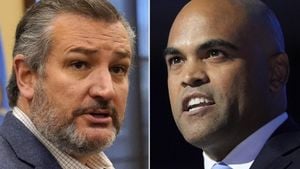Violence continues to simmer between Israel and the Palestinian territories, raising alarms among humanitarian organizations attempting to navigate the consequences of military actions. Recent events have added fresh layers to this tragic saga, highlighting the complex intersection of military operations and humanitarian aid.
On December 1, 2024, the Israeli Defense Forces (IDF) announced they conducted a targeted strike on a vehicle inside Gaza, killing Hazmi Kadih, who is also known as Ahed Azmi Qudeih. Kadih was reportedly involved in the October 7 terror attacks, which shocked the world and prompted condemnation against Hamas.
Interestingly, Kadih had been employed by World Central Kitchen (WCK), known for its commitment to feeding those affected by disasters—all good work, as many would agree. The irony, of course, is hard to ignore: here is this humanitarian organization expressing shock over the killing of one of their aid workers, stating they were “heartbroken” and claimed ignorance about Kadih's alleged ties to terrorist activities. Prior to Kadih's death, WCK had called for an independent investigation after several of its workers were killed during prior Israeli strikes back in April, claiming they were not getting credible assessments from the IDF.
Following Kadih's elimination, some experts speculated whether WCK would now insist on accountability for lapses within its own ranks. This past incident seems less like a coincidence and more like one more chapter added to the storied relationship between aid organizations and conflict zones. After all, Kadih had shown support for the attack on social media, intensifying scrutiny over WCK's hiring practices—something the organization may now wish to reassess.
Meanwhile, international media coverage of Kadih's death sparked controversy. Major outlets such as the BBC, NPR, and Reuters focused heavily on the narrative of Israel killing aid workers, emphasizing the tragic loss for WCK and the suspension of its Gaza operations as if to paint Israel as the villain. Strikingly, many reports failed to mention Kadih's direct links to the October 7 attacks.
Conversely, other outlets like The New York Times and ABC News gave due consideration to the IDF's characterization of Kadih as a terrorist. These news reports, acknowledging the nuance of the situation, potentially shed light on the often-complex realities behind humanitarian work within volatile regions.
Striking the right balance has become increasingly difficult for organizations operating within such fraught environments. Humanitarian groups often operate under the premise of neutrality and compassion; yet behind-the-scenes realities can be disturbing. For example, allegations of having sympathizers among their ranks have plagued organizations like UNRWA and Save the Children.
Tragically, the unsettling realities don’t stop there. Around the same time as Kadih’s demise, the Palestinian health ministry reported the deaths of four other Palestinians during IDF operations in the West Bank, particularly targeting the Jenin district. These incidents followed mounting intensifications of raids, scaffolding worries about the fragility of life amid military conflict.
The armed clashes have left at least 780 Palestinians dead within the West Bank since the onset of the recent military escalation against Gaza, where prior reports indicate the death toll has surpassed 44,000. The Palestinian Red Crescent Society reported thwarted attempts to reach bombing sites, raising concerns over humanitarian access.
One terrified resident, speaking to AFP, recounted the harrowing encounters with Israeli forces, expressing dread over the fate of many young men he knows who had been caught in the violence. Indeed, as the dust settled—literally and figuratively—witnesses recounted airstrikes and troops invading their communities, leaving anxious uncertainty and despair.
What's more, the occupied West Bank’s prolonged instability raises serious ethical questions for many humanitarian organizations operating there. The criticism they face is exacerbated by the veil of perceived respectability those groups often cultivate, leaving them largely unchallenged and seemingly beyond accountability for actions attributed to employees with extreme affiliations.
Numerous observers have noted this unsettling trend of duality thriving within organizations claiming to be apolitical. They hope to uphold humanitarian ideals but sometimes unwittingly become enmeshed with those harboring extremist views or allegiances.
One wonders how long such contradictions can persist without serious ramifications. How many more stories like Kadih’s, with its painful juxtaposition of humanitarian efforts marred by underlying violence, will emerge? The general public awaits transparency.
Backtracking to the IDF strikes, let’s examine the impact of narratives twisting and turning through the international media. Such dualities don't just create confusion; they often have ramifications for how these conflicting narratives influence public perception and policy.
Supporters of Israel assert its right to self-defense, pointing to Hamas’s long history of aggression. Many recognize military action as necessary to target specific threats, especially those embedded within civilian settings, which adds layers to their justification. On the flip side, opponents criticize Israel's military tactics as indiscriminate, often yielding significant civilian casualties, and hailing it as human rights violations amid cries for accountability.
It seems there's no easy end to the spiraling conflict. With dynamics shifting virtually overnight, local populations are left bearing the weight of geopolitical maneuvering—victims of veterans' decisions which remain far removed from everyday life. The cancellation of Gaza operations due to the fatalities could mean reduced access to food and humanitarian support for many residents who depend heavily on organizations like WCK.
This swirling conflict doesn’t just involve the immediate players. Protesters spanning the globe express solidarity with Palestinian causes, calling attention to perceived injustices. Global dialogue is increasingly centered around themes of accountability, humanitarian access, and ethical responsibilities of institutions operating within combat zones.
So where does this leave us? With pressing questions surrounding governmental accountability, media transparency, and humanitarian access, the stakes have never been higher. The apparent dissonance between narratives and reality calls for rigorous evaluations of how we engage with stories coming from regions fraught with tension.
For now, the world watches as the situation develops, holding its breath for signs of breakthrough or change. What’s certain is the need for comprehensive discussions about humanitarian norms and the significance of maintaining political neutrality when faced with violent realities—a reality that's tough to digest but necessary for addressing deeply rooted issues.



